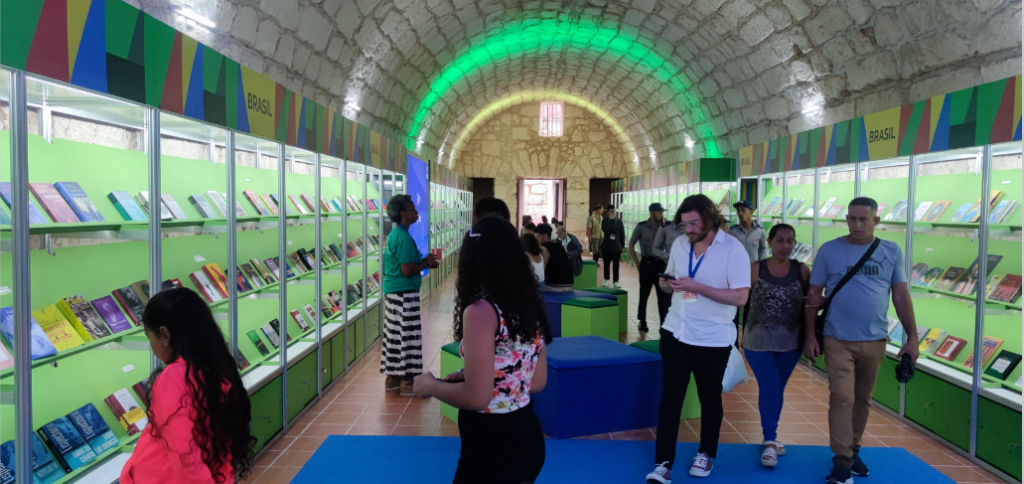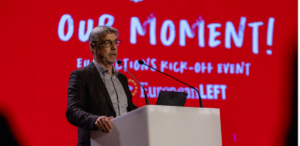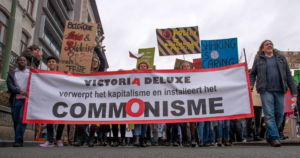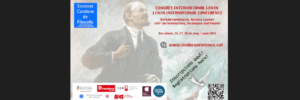Two consecutive publishing events took place in Havana, Cuba, in February: the Meeting of Theoretical Publications of Left Parties and Movements and the Havana International Book Fair. This year, the Fair’s guest country was Lula’s Brazil, which provided the meeting with a flavour of the latest emancipatory tide in most countries of Latin America and the Caribbean.
The Book Fair in Havana was held under José Martí’s motto “Leer es crecer” which can be translated as “Reading is Evolving”. As Martí is a political hero not only of Cuba but also a broader Latin America, the motto fitted well also to the current left tide in Latin America which contributed to the welcoming social atmosphere of the event. The Fair is an annual important book event in Latin America, with presentations and sales of books mainly in the Spanish language even if many books in other languages were presented by publishing houses from all over the world. Books spread across the iconic fortress of Cabaňa in Havana whose part is also a complex where Che Guevara resided during the revolution in 1959.
The 10-day Fair attended by local and foreign hundreds of thousands of people was preceded by a more focused 3-day Meeting of Theoretical Publications of Left Parties and Movements with around 100 influential intellectuals, mainly from Latin America but also from Asia, Africa, Europe and North America.
Reflections of Left Parties and Movements
The “Meeting of publications” took place in the Palacio de Convenciones, the main congress centre in Cuba. It was the 2nd edition of this event (February 12-14, 2024). While the first edition was of an introductory kind, the second attested continuity and commitment to the future. It was opened by a panel on the burning issue of the left parties and movements facing fragmentation in many countries and having to unite to create a strong emancipatory force again: “How to overcome the traps of the doctrine without abandoning the theory? How to articulate ourselves without losing our identity or getting lost in the difference?”
Several answers to these questions were offered by Isabel Monal, a famous Cuban philosopher, a founder and editor of the Marx Ahora (Marx Now) journal, and ex-director of the Institute or Philosophy and of the National Theatre, to mention just a few of her positions. At the Meeting, a tribute was paid to her lifelong work together with a presentation of her book Ensayos Americanos (American Essays), explaining various original contributions and common traditions of left-wing thought (“la unidad en la variedad“) in Cuba in the dramatic colonial and imperial contexts of Latin America and the struggles against these challenges, similarly like in her two-volume work Las Ideas en América Latina (The Ideas in Latin America). In her interpretation of José Martí, for example, she explains in her exemplary way a transition from liberalism to antiimperialist democratism, which has its revisited importance also today.
Other key Cuban intellectuals were not missing in the Meeting as well. Jorge Hernandez, for example, a historian, sociologist and political scientist from the University of Havana, was also present. Following Martian, Marxist and Cuban socialist ideas and practices, he identifies the US contradictions with unsustainable approaches to Cuba which were condemned by the majority of countries in the United Nations, a topic of apparent relevance not only in Cuba and Latin America.
Among foreign speakers, Ignacio Ramonet, a Spanish journalist and expert on communication living in Paris, was an unmissable personality of the encounter. His long practice as editor-in-chief of Le Monde diplomatique, among others, has given him an intensive experience in the public sphere. He stressed that some current neoliberal and neoconservative politicians and ideologues, without having any theoretical frame, robbed left-wing concepts and criticized the mainstream media in an eclectic way, a phenomenon that shows the low intellectual level accepted in current politics.
The Meeting examined also theoretical thinking as applied into practice. It was visited by President Miguel Díaz-Canel, who attended a discussion with intellectuals and then gave his talk. The debates included Abel Prieto, a former minister of culture and current president of Casa de las Américas (The House of the Americas), the institution which aims to develop cultural relations among the peoples of Latin America. In the last session, Manu Pineda, a Spanish member of the European Parliament, supported the Palestine people. Then, the Meeting accepted a declaration on support of the Palestinian people in their resistance against occupation and repression, particularly on the occasion of the contemporary mass killing of children, women and men in Gaza.
Of course, it is not possible to mention all the speakers in the Meeting which came from Venezuela, Mexico, Brazil, China, Vietnam, the Dominican Republic, Zimbabwe, the US, Italy, etc.
The Book Fair’s Left Tide
The consecutive event was the biggest annual international event in Cuba, Havana International Book Fair, already in its 32nd edition (February 15 – 24, 2024). Hundreds of thousands of people attended the event with physical and digital books in the Cabaňa, one of the oldest fortresses in Latin America and the Caribbean with a wonderful view over the Havana Bay, as well as in Old Havana and places in other provinces. While the book fair in Guadalajara in Mexico is an annual grand book event, the biggest in Latin America and one of the biggest in the world, the Fair in Havana is special of course because of its political culture. Nevertheless, while not each presentation or book is political in the Havana Book Fair because there are also many books on other topics, including texts for children, the place of event creates apparently a unique opportunity to organise presentations and meetings with emancipatory content.
This year’s Fair was dedicated to two outstanding authors: already mentioned Isabel Monal and also Francisco López Sacha, a professor of art and cinema, a writer and chairman of the Cuban Writers Association. Other authors were awarded prizes.
Because Brazil was a guest of honour in the Book Fair this year, the main attention was paid to this country. Of course, only a selection of 6 000 Brazilian books was presented in launches or workshops. One of them was Lula. La biografía written by Fernando Morais, one of contributions on the contemporary left tide in Latin America and Brazil in particular, dealing with an extraordinary life of country’s president Inacio Lula da Silva in two terms, then a prisoner under the right-wing authoritarian government, and now a president again, elected for the third time. He is known for his support of social justice and participatory democracy. The Fair was a possibility to express a revitalisation of good ties between Cuba and Brazil after it was damaged by the previous Brazil’s President Bolsonaro. Brazil’s Ambassador to Cuba, Christian Vargas, said that the Fair would be an important step to develop bilateral relations via culture thanks to discussions over many books and with around 30 visiting Brazilian authors. Writers Maria da Conceição Evaristo and Ailton Krenak, a black and indigenous personality respectively, were among them.
There was also a book launch devoted to La doctrina Monroe, edited and co-authored by Carlos Oliva Campos on the recent occasion of the 200th anniversary of the doctrine which brought about step by step both the end of the Spanish colonial rule and the establishment of new similar practices in the Americas. Many other presentations of books took place as well, accompanied also by cultural activities such as several kinds of literary forum, workshops, concerts, films and performance of capoeira.
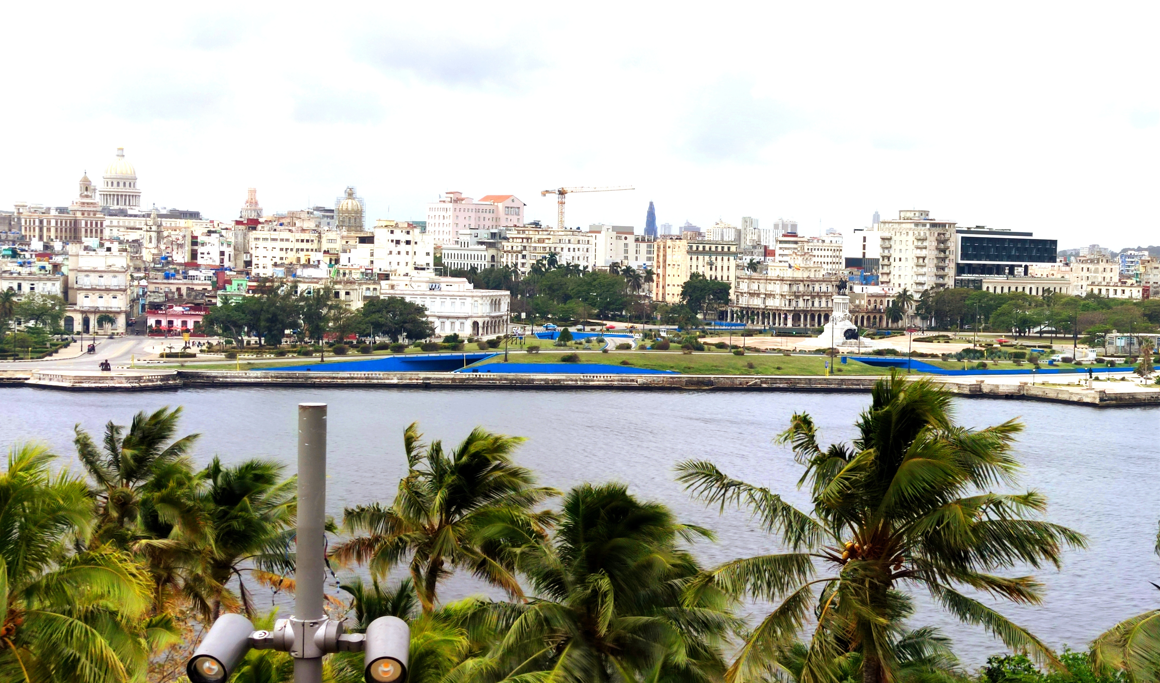
Cuba’s Cultural Diplomacy
While Cuba deals with economic problems caused by the consequences of the US embargo and the pandemic of COVID-19 which both are not easy to overcome in the demanding process of economic transformation, the two events around so many publications and debates showcased the cultural diplomacy of a country that is full of energy and inspiration in the sphere of culture and, in particular, emancipatory political culture. Challenges did not push Cuba into isolation; on the contrary, they motivated it to be more integrated into cooperations with Latin America and the majority of the world.
Martin Lampter is a philosopher and political economist who has worked at universities mainly in the Southern and Central European countries and in South America. He cooperates with SPED (transform! europe member organisation).
Image: Friendly atmosphere at the book fair 2024 @Martin Lampter
